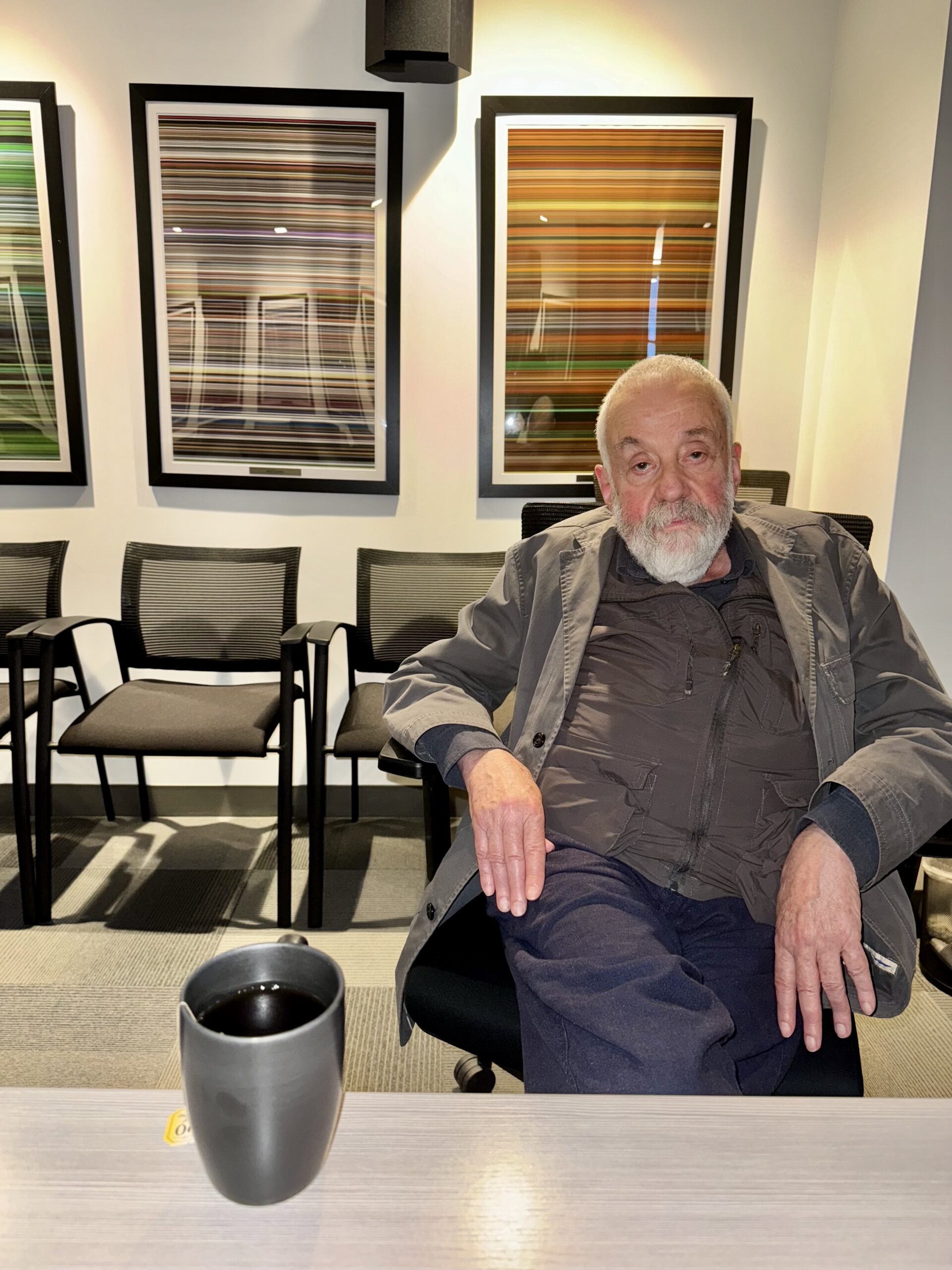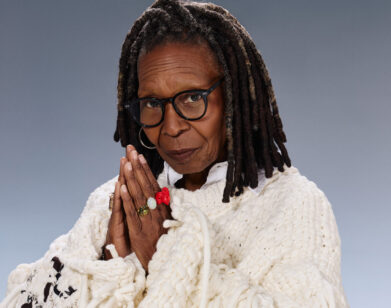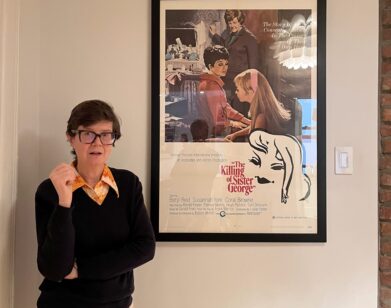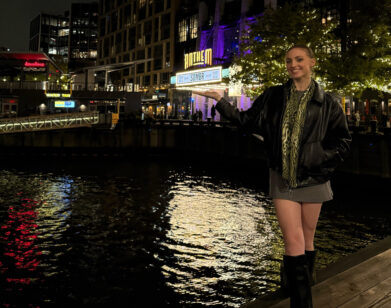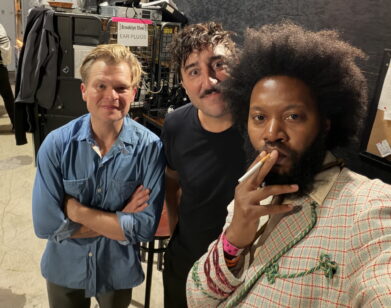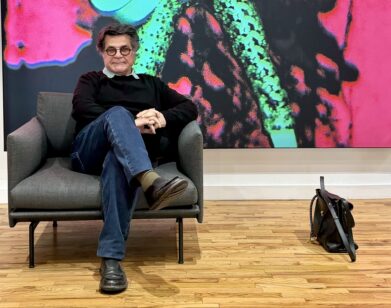NYFF
“It’s Fucking Bullocks, Basically”: 45 Minutes With Hard Truths Director Mike Leigh
MONDAY 5:45 PM OCTOBER 7, 2024 NEW YORK CITY
When he met up with Jeremy O. Harris this week to talk about his new film Hard Truths, the director Mike Leigh was mostly pleased to be spending time in New York for the movie’s premiere. Los Angeles, however, is a different story. “I’d rather have my eyeballs pulled out of my corpse than go to L.A,” exclaimed the Oscar-nominated and BAFTA-winning writer and director. “It’s a tedious place to be.” But if the many requirements of festival season have begun to wear on Leigh, he’s still having as much fun as ever making movies. Hard Truths finds the director reuniting with the extraordinary English actor Marianne Jean-Baptiste, who starred in his 1996 Palme d’Or-winning film Secrets & Lies. This time, she plays Pansy, a working-class woman constantly and often riotously on the verge of physical and emotional collapse. Just after the movie’s New York Film Festival premiere, Leigh joined us to talk about the troubled state of cinema and whether he’d ever make a James Bond movie in order to fund his other projects. “The entire film would be about James Bond going to visit his old mother in a flat somewhere,” he joked.
———
JEREMY O. HARRIS: I decided to wear an outfit that I thought might infuriate Pansy.
MIKE LEIGH: Yeah, man. You’d really piss her off.
HARRIS: Where did her sensibility come from?
LEIGH: Well, that’s a hard question to answer. I feel like you will understand this idea of tapping into a sense of people consciously, but also subconsciously. As you probably know, the way that I work on these films is to really embark on a journey of discovering what the film is by making it.
HARRIS: Yes.
LEIGH: Once you’ve done the thing, you don’t really know where you started because what’s important is what you wound up with. I worked with Marianne Jean-Baptiste previously. We’ve worked together a couple of times, way back in the nineties. I also know her personally and have kept up with her. She’s so versatile, but also has an enormous sense of humor and sense of the grotesque. Do you know her at all?
HARRIS: I have never met her. I was so upset that I wasn’t in the most crowded theater in the world to see this movie. It’s one of the great comedies, while also being deeply heartbreaking.
LEIGH: There you go. Well, she’s done an enormous amount of stuff. She’s a character actor and those are the actors I like to work with. I don’t work with actors that just play themselves in a boring way.
HARRIS: When you made the call to Marianne Jean-Baptiste, what was that first conversation like?
LEIGH: We’d been communicating in an ongoing way, so there isn’t really a call where I say, “Here’s this script. What do you think?” I always say to an actor, “take part,” and they either say yes or no. But they know, as she knew, that this would mean embarking on a journey without having any idea what we were going to do. We merely enjoy working together and she wanted to do it again. But then, of course, we sat down and started to talk this character into existence. I always work separately with each actor.
HARRIS: I just made a movie with my friend that was very immediate. It’s not completely your process, but it’s a process that he’s carved out for his filmmaking that I’ve now become a part of, wherein he creates a structure and we build it as we go.
LEIGH: Using improvisation?
HARRIS: He hates the word “improvisation.” We improvise and have a conversation, but the script is written and it stays static.
LEIGH: Sure. Our scripts, once they’re written, they’re static, too. There’s nothing you see on screen that is being improvised in front of the camera. My thing has always been, “That’s how we do it or we don’t do it at all.” It’s as simple as that. I wouldn’t know how to make a film if I didn’t do that. And there have been occasions when people say, “Well, that’s not really practical,” and you tell them to fuck off.
HARRIS: How many hours a day do you work?
LEIGH: All day?
HARRIS: All day?
LEIGH: From 10 to six, but it’s the same thing. I used to always work from nine, but because I’m old, I now work from 10. What a compromise.
HARRIS: When did you decide you were old?
LEIGH: Last year, when we made this film.
HARRIS: You come from the theater. I come from the theater. Did it feel like the pace of theater wasn’t servicing you anymore?
LEIGH: No,that’s absolutely nothing to do with it at all. When I do a play, that’s what I do. And it’s all about the play. But when I make a film, it’s about that. Actually, you’ve just said something that never occurred to me. A play is a play and a film is a film. The only technical difference is that when we make a film, we don’t contract all the actors. We don’t contract everybody to be there all the time from day one.
HARRIS: That makes sense.
LEIGH: Because it’s expensive. I work with this actor and that actor, and then gradually we build things up and other people are waiting and all that. You can’t have everybody on the payroll all the time, but everyone does get paid. In the theater, it’s a different ballgame because you’re doing a play, so people are on the payroll but still have to hang around waiting when they’re not called. It’s interesting what you just said, that making a film is a way to get away from the conditions of the theater, or vice versa. But I’ve never thought, “Is this a play or a film?” If I’m making a play, I’m thinking in theatrical terms. If I’m making a film, I’m thinking in film terms. In the middle of this film, they go to the cemetery and on the way out to the cemetery is a motorcyclist’s funeral and a cortège with a motorcycle sidecar comes through. Well, let’s face it: you’re not going to put that on a stage. The play has got to be constructed in a way that makes it feasible. Of course, a play will be performed any number of times, so it’s susceptible to the vicissitudes of performance and audiences and all the rest. But in the end, a play is a play with its own dynamics and requirements.
HARRIS: I love that.
LEIGH: It’s a fact.
HARRIS: Are you going to come back and do a play anytime soon?
LEIGH: I’d like to. The truth of it is that it’s so bloody hard to get a film up and running. And with two phone calls, I could get a play set up in London without too much difficulty.
HARRIS: This is something I tell people all the time.
LEIGH: But getting a bloody film… I mean, we talk to backers and I say, “Can’t tell you anything about it. Don’t know what it’s going to be. We’re going to make it up when we do it. Can’t discuss casting. And by the way, don’t interfere with it when we’re making it.” And I’ve been lucky over the years, we’ve gotten away with it any number of times. But a large proportion of times when we’ve said that, they’ve told us to fuck off, basically.
HARRIS: Even after years of BAFTAs and Oscars—
LEIGH: I haven’t got any Oscars.
HARRIS: Oh, nominations.
LEIGH: Yeah, yeah, yeah.
HARRIS: So after all these years and all this esteem, it’s not like you can just walk in and get someone to write a blank check.
LEIGH: No. In fact, it’s become harder. Because of the streamers. Algorithms tell them what they should do. The idea that the backer should not interfere or veto what’s happening, that’s gotten worse and worse, as you know. But I’m not complaining. I do, however, complain on behalf of young filmmakers.
HARRIS: Totally.
LEIGH: This is what actually happened to somebody, a guy I know who made a number of films with a guy who was a cinematographer. He was asked the question, “Why is your cinematographer a man?” Actually the question was, “Why isn’t your cinematographer a woman?” And he said, “Well, because he’s a man, basically.”
HARRIS: Yeah.
LEIGH: The point is that he chooses the collaborator, the right collaborator, not on the basis of their gender or their race or their orientation. It’s the right person to work with and all of that.
HARRIS: I do think that there are a lot of interesting things that have come about from people asking those questions. There was a time when people would not have even imagined that a woman could do the job or be a great cinematographer. There are still people who hold those preferences. And we should allow certain directors to look differently at who they’re asking to invite to work with them.
LEIGH: Yeah, and it’s great that there are, of course. I mean, a very tiny number of people have said to me, “Do you think there’s a problem with this film because you’re an old white director and there’s Black actors…?” I think it’s some fucking bollocks, basically.
HARRIS: Well, what’s bollocks is that it erases the agency of the actors inside of the process, right?
LEIGH: Yes. And what I haven’t done and wouldn’t do is deal in tropes and stereotypes of Black characters, which most movies about Black characters do.
HARRIS: Yes.
LEIGH: That’s part of the joy of doing this. But you know what? I’ve done a play in Australia about Greek Australians. I did a play in London about Jews. I’ve done a film in Northern Ireland about Catholics and Protestants and the political divide, et cetera. I’ve made films about upper-class English people. For me, it’s about humanity.
HARRIS: Absolutely. So, my mom’s a hairstylist, and so many of these amazing scenes inside the hair salon really brought me back to my childhood and the world I inhabited. How did you guys come up with that as a pillar of the story?
LEIGH: Well, in inventing the character of Chantelle with Michele Austin, somewhere along the line we decided that she was a hairdresser. I’ve been around North London a lot. I’ve lived there. My oldest son, Toby, he’s an illustrator and he lives in Tottenham, which is a very Black area. On the street just near where he lives, every other shop is a West Indian men’s hairdressing shop. Of course, they’re like clubs. So, I thought, “Great!” Michele went off and researched and trained at doing all the stuff.
HARRIS: She learned how to do hair?
LEIGH: Of course.
HARRIS: That’s amazing.
LEIGH: Well, that’s what actors always do on my stuff. And we were blessed with two brilliant character actresses who played the two women that are having their hair done. So yeah, you get the ideas as you go and you grow them and it becomes the thing.
HARRIS: Again, it’s so depressing. I’m thinking of how many of my friends feel stifled by the foundation of our cinema landscape right now, where it feels like it’s easier to make a movie for $10 million than it is to make a movie for $1 million. But in order to make the $10 million movie, you have to have these five super-famous people in it and do it in this way with these specific companies. I have friends who’ve been trying to put together low-budget movies, and it’s really difficult for people to take a risk on a low-budget, right?
LEIGH: Yeah.
HARRIS: Have you ever thought of another way for you to make your movies, wherein you do sell your soul to make a Bond movie and use all the money you get from that—
LEIGH: Can you imagine a Bond movie by me?
HARRIS: I would love a Michael Leigh Bond movie.
LEIGH: The entire film would be about James Bond going to visit his old mother in a flat somewhere.
HARRIS: If Barbara Broccoli’s listening, you should make it.
LEIGH: Barbara Broccoli’s got more sense.
HARRIS: How do you feel about coming to America and sharing this movie here? Do you feel like American audiences have understood the nuances and sensibilities of Hard Truths in the same way British audiences have?
LEIGH: We made this film over a year ago. For the first half of this year, we sat around wondering what was going to happen to it. First of all, it was turned down by the Cannes Film Festival.
HARRIS: Wow.
LEIGH: Then it was turned down by the Venice Film Festival. Then it was turned down by Telluride, where I’ve been embraced a number of times. We sent it to Toronto, who loved it, followed by New York. It’s an Anglo-Spanish co-production company, so they encouraged us to take it to San Sebastian, which is a big film festival. And next week, it’s in the London Film Festival. To answer your question, Toronto blew us away. It was fantastic. San Sebastian screened for a Spanish audience with Spanish and Basque subtitles. Completely blew us away. You wouldn’t know the difference.
HARRIS: Wow.
LEIGH: And here, first in the Alice Tully and then in the Walter Reade, an explosion. It was fantastic. Years ago, when we couldn’t make movies at all, I went to see an American producer living in London in the eighties and he said, “I like your movie. I like what you do.” I was doing television films. I’ve made one feature film, Bleak Moments. He said, “I like your films, but your films will never ever work in the States because they won’t have any idea what they’re about.” He was wrong. And every film I’ve made, with greater or lesser degrees of success, have worked here and been popular.
HARRIS: I think one of the reasons this one works so well here is that Brits have a very good ear for insults. Pansy sent out all of these amazing barbs throughout the film. For me, that was the runaway success of how you hooked me into this movie. How did you guys keep coming up with so many great ones?
LEIGH: Well, once you get on a roll…
HARRIS: What was your favorite in the edit?
LEIGH: I don’t know. We were talking about this yesterday. There’s a moment with Marianne, they’re at the graveside and she did something with her hands. I just love all of what she does.
HARRIS: I love the moment with the guy in the car.
LEIGH: Oh, yeah.
HARRIS: The road-rage one. And also when she calls that lady an ostrich.
LEIGH: That’s great.
HARRIS: It’s so good.
LEIGH: I know. Once you get on a roll, it all comes out. You find loads of it. We had a ball.
HARRIS: Now that it has found its festivals, it is on its roll. Do you enjoy being a part of that conversation and making those journeys?
LEIGH: Well, you just do it. I’ve been doing it for a long time. It’s harder now because I’m a little bit handicapped. It would be perverse to say, “No, I’m not doing it.” Actually, there’s one event they wanted me to do in London. It was later in the week, and I’ve got a hospital thing the next day, I’ve got a funeral and all that. And I said, “I’m not doing it,” and there was a lot of fuss. But with a red carpet, where you’ll be photographed, I’m going to have to say no because it’s just too much. I’m 81, and Marianne and Michele are going to be there. They’ll do it, whatever. It’s not the end of the bloody world. But to answer your question, you’ve got to go. The bottom line is quite simple. You make a film to be seen by people, and if you want it to be seen by people, you’ve got to do something about it. I’d love to make a film and not have to do all this shit, basically. I mean, it’s fun to come to New York. I like coming here. But they want me to go to L.A. I’d rather have my eyeballs pulled out of my corpse than go to LA. It’s a tedious place to be.
HARRIS: That’s a great note to end on.

